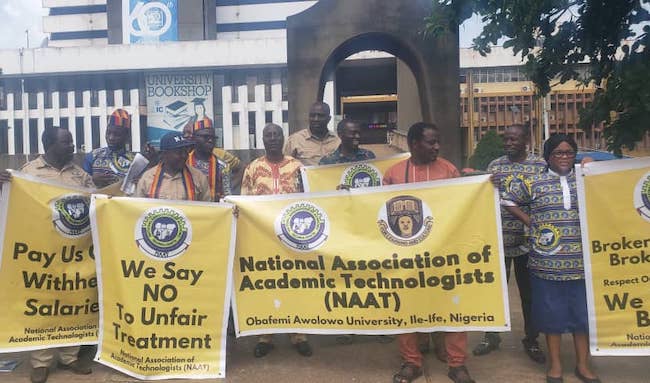Members of the National Association of Academic Technologists (NAAT) at Obafemi Awolowo University (OAU), Ile-Ife, organized a peaceful protest expressing their dissatisfaction with the non-payment of withheld salaries and pending allowances owed to them by the Federal Government. The protest occurred on the university campus, where members displayed placards that illustrated their grievances. They expressed a firm resolve to continue their demonstration until they received their rightful payments, highlighting their sense of urgency regarding the situation. The protest encapsulated the broader discontent within the academic community over unfulfilled governmental promises, particularly dating back to an agreement from 2009 which the protesters argue has not been fully honored.
In a briefing after the demonstration, the NAAT chairman, Mr. Matthew Oluwaniyi, articulated the frustration felt by union members. Represented by the vice chair, Aminu Rotimi, he detailed that the Federal Government had withheld their salaries for over five months due to a strike that took place in 2022. This strike lasted for five and a half months, during which time the income of union members was frozen. Although they received one month of their withheld salaries in October, Oluwaniyi pointed out that communication from the government regarding the remaining payments has been insufficient.
Oluwaniyi emphasized the union’s grievances concerning the treatment they have received from the Federal Government, which has seemingly disregarded the implications of their strike. He expressed sorrow over the continued lack of proper negotiations and responsive measures from the government, despite multiple pleas made by the union members. The protest served as both a warning to the government and a demonstration of the technological workers’ frustration, insisting that the government’s unresponsiveness is echoing through their everyday work and financial stability.
Additionally, the protests didn’t just focus on salaries; they also addressed the outstanding allowances that the union has yet to receive. The demands included the implementation of the occupational hazard allowance, a critical component of the 2009 agreement that the union believes is vital for safeguarding their well-being at work. The failure of the government to address these issues has added to the growing unrest, as the members contend that their rights are not being respected or fulfilled, leading to a sense of betrayal.
Further amplifying the issues surrounding underfunding, Dr. Taoreed Adesiyan, the former secretary of the union at OAU, raised concerns about the alarming shortage of staff in university laboratories. He pointed out that laboratories across Nigerian universities suffer from severe understaffing, which in turn contributes to overwhelming workloads for remaining staff, endangering their health and safety. Adesiyan’s comments underscored an important public health concern within the educational system, prompting a demand for the Federal Government to act on the urgent need for hiring more workers in academic environments to ensure adequate support and safety for those currently employed.
In conclusion, the NAAT members’ protest at OAU illuminates broader systemic issues within Nigeria’s higher education system. Their struggle for fair treatment by the Federal Government reveals underlying challenges that extend beyond mere salary disputes. As the union continues to advocate for respect and acknowledgment of their agreements, their situation may serve as a critical rallying point for other academic unions facing similar challenges. This situation calls for immediate government action to alleviate the financial burdens on workers and to honor past commitments, ensuring that academic institutions can function effectively and safely for both workers and students alike.














